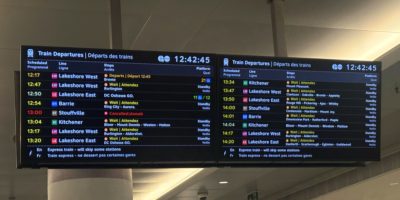By Sarah Krichal
The former Ryerson campus radio station may be dead and buried, but the money it raised is getting used.
CJRU 1280AM The Scope, the current Ryerson radio station, has been collecting financial aid from past radio station CKLN.
CKLN was taken off the airwaves in 2012, but the university held $247,456 in student levies in case a new station was formed.
The Eyeopener has learned that The Scope was able to collect the majority of those levies to put towards its AM and FM applications.
The Scope is now collecting a student levy of $10.35 per semester under the Radio Ryerson Inc. name which has allowed them to dedicate finances towards student space, renovation, equipment usage for non-RTA students, a transmitter and the application for Canadian Radio-television and Telecommunications Commission (CRTC) to permit Ryerson to have a station, according to Jacky Tuinstra Harrison, station manager of The Scope.
“With the mixed revenue model we proposed, the student levy is leveraged to grow more opportunities that fund new projects for students and create new engagements with our partner agencies,” Harrison said in an email. “So I would say the levy is what enables [it] to grow.”
The Scope will be prioritizing campus-related programming, something CKLN was criticized for not doing in the past.
“I think that it’s important for all campuses to have community radio and I think that campus community radio can really be a heart of a lot of campuses,” said Elissa Matthews, program director of The Scope.
The station has been recognized as eligible for a workshop application and received a grant of $110,000 for the creation of a community radio mobile app through the Community Radio Fund of Canada (CRFC). Partnering up with CHHA Voces Latinas 1610AM, The Scope will begin a workshop that will consist of more thorough training for volunteers, with the goal that higher-quality production will result in more community participation.
“I think it shows that the Community Radio Fund of Canada sees the need for non-profit stations to innovate and change,” Harrison said. “This project will really grow our station, but also help community media producers generally.”
In addition, The Scope is currently looking into getting permission by Industry Canada to use HD Radio, a “digital radio technology using IBOC (in-band on-channel) that allows hybrid transmission of both analog and digital radio,” according to the station’s website.
Ryerson radio began in 1970, when a group of Ryerson RTA students came together to create a station called Ryerson Community Radio, independent of the school’s administration. They eventually changed their name to CKLN in 1978 and had their application approved by the CRTC to have an FM station (88.1 MHz), becoming the only student-run station on the airwaves.
The core of the station was supposed to highlight Ryerson community, but CKLN eventually had its license revoked by the CRTC due to losing Ryerson as its focal point even while it was being broadcast through campus. The station’s downfall was also sparked by things such as infighting, a decrease in donations, staff shortages, increasing amounts of debt and a negative reception towards increase in student levies.
“There was an appeal of the license revocation, at which point I helped in the appeals process that was quickly rejected before the courts even heard it,” Harrison explained in an email.
Harrison remembers CKLN fondly.
“You can’t really replace CKLN, it was the great community radio station,” Harrison said. “I would only say that I am very, very excited that Toronto will have another campus radio station.”
CLARIFICATION: Though The Eyeopener has previously reported on The Scope, this article failed to mention that after a 2011 referendum showed that 84 per cent of Ryerson students were in favour of creating and funding The Scope, the organization reached a new funding agreement with the RSU. In the same referendum, the re-allocation of student levies (from CKLN to a new campus station) was approved. From 2013 until Dec. 2014, when The Scope was approved by the CRTC as a radio station, the organization was functioning as a non-profit with money from the fundraising and levies from the 2011 referendum.
CORRECTION: In an earlier version of this article, 1610 AM Voces Latinas and Radio Ryerson Inc. were misspelled.












Leave a Reply